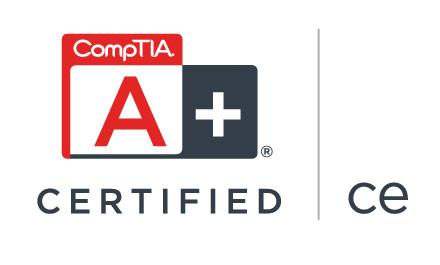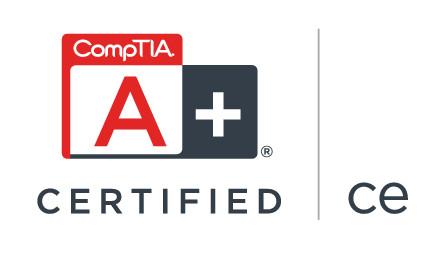Tips to Get an A+ on Your CompTIA A+ Exam

For those of you that have been in the IT field for awhile, your CompTIA A+ certification exam probably don’t stick out too much in your mind because of all of the certifications that followed it. However, for those of you that have just worked your way into the IT field or are considering entering the IT field, you know that the A+ certification is the stepping stone to further success with certifications and success in the field. For most of you this will be the first certification exam you will have to take and you're probably unsure about how you should study for it and what you'll need to know.
I was lucky enough to be working at a company that specializes in IT training so I was able to use our training materials and draw on the knowledge of the incredible staff at Train Signal to help me succeed when it came to obtaining my A+ IT Technician certification. What I want to do today is detail my experience for you and provide you with techniques that helped me obtain my CompTIA A+ certification in hopes that you will be able to do the same.
How Did I Get Here?
If you read my bio on Train Signal Training you can see that I obtained a Computer Information Systems degree from a four year university. After college I had spent some time in and out of the IT field, most recently out of the IT field at an insurance company.
I started at Train Signal at the end of March 2008 and jumped back into the IT field after that two year layoff. I was a bit rusty when I returned to the IT field, as you can probably imagine, but I always made sure I maintained a certain level of interest in IT topics while I was working outside of the field. This allowed me to transition into my role here as a Technical Support Specialist fairly smoothly.
The reason I'm sharing this with you is because I want you to know that you will be able to obtain your A+ certification, even if you've been out of the IT field for quite a while or are considering entering the field for the first time.
Potential A+ Exam Challenges
One of the biggest issues I dealt with was misplaced confidence. I actually failed the CompTIA A+ Essentials exam the first time I took it.
Now, this was the first certification exam I had ever taken, but that really didn't have much to do with why I didn't pass. I have been working with computers all of my life so I kind of felt like I could walk in and knock out this exam no problem.
The reality was that there is a lot more to this than knowing how to put together and work on a computer, and I had to find this out the hard way.
So, on test day I click "Start" on the screen and begin the exam. I'm feeling good until about the fourth question, which starts something like, "Which IRQ is used by ..." Hmmm, OK, well I'll just come back to that one.
Question 5: "Which type of computer memory modules have "X" number of pins?" Alright, I know what memory is. Hmmm, OK, so I've seen SIMM and DIMM; SIPP and DIPP just sound made up ... I'll just go on to the next question. I wish I knew I was going to have to dissect a memory stick before the exam.
Oh well, Question 6: "Which SCSI standard supports the longest maximum cable length?" OK, I wonder when I can reschedule this exam. I think you get the idea.
Knowing how to take apart a computer and diagnose a problem is half the battle when it comes to the A+ certification. You have to know the origins of certain PC components, not only what they do but how they affect the system as a whole. What is the best hardware or software to use in a certain PC in a certain situation? You need to know the details of why one component is different than the other and what each one would be used for.
This can be challenging for somewhat self-taught IT folks because you have to tear down what you think you know and focus on what you need to know.
For some of you that are more experienced, you may be able to walk into the exams and pass with no problem, but for the majority of you, you'll need to study the right way to make sure you have the knowledge necessary to succeed.
With this thought in mind, to me, it almost seems easier for someone with limited technical knowledge to start fresh with the A+ material because they don't have any preconceived notions.
For those of you that would like to obtain your A+ certification but feel like you don't have enough technical knowledge to get started; in this respect, you're probably better off than some of the more tech savvy people that are trying to obtain the certification.
So don't be discouraged to get started with this material because anyone can do it with a little bit of effort.
How I Righted the Ship
I realized that I needed to put more effort into studying so I started to devise a plan.
The first thing I did was to watch our CompTIA A+ Training video again. I had watched it before my first exam but looking back, I wasn't "actively" watching the video.
This time, I watched the course and took notes on particular topics and keywords, and I watched certain parts of the video that I didn't fully understand multiple times. Instead of just being presented the information, I was actually retaining the information.
The next thing I did was to take my notes home with me every night and just take twenty or thirty minutes to read over them, commit some of the information to memory, and apply some of my information by taking a look at and performing some tasks on my own computer and printer. This brings me to my next topic ...
Get Your Hands Dirty
The Train Signal A+ course does a great job of actually showing you what you'll need to know rather than just discussing it. The instructor shows you different components and discusses each of them. The visuals and commentary are exactly what you need to commit this information to memory.
However, there is no substitute for digging in and getting your hands dirty on your own. In the videos David Davis shows you exactly what you will need to know, but to have confidence to implement this knowledge in the real world you will have to have some experience working on systems yourself.
It's good to have a computer and printer (or different types of printers) you can look at and just play with to get some hands on experience. This will definitely translate to a better exam score.
For me, it was great to be able to take a look at a topic presented to me in one of the videos and apply this knowledge to a computer I'm physically working on. When I was taking the exam I was able to think back to a CPU I had physically installed or an ATX Motherboard I had actually worked with, which made the exam that much easier.
Practice? We're Talking About Practice
For all of you sports fans out there, the title of this section is taken from a classic Allen Iverson press conference that you can see here:
This can probably only be rivaled by "Playoffs? Playoffs?"
Alright, so getting back on track, another aspect to my studying for the A+ exam was practice tests. That's right, I'm talking about practice.
Practice exams do a couple of things for you.
You get to see how the test questions are structured and the type of wording that you will see on the exam. This is important, especially for first time test takers; because it will help you get into a certain frame of mind that will allow you to fully understand the questions that you will see on the test.
It's a great supplemental study tool that will allow you to gauge your knowledge in particular subject areas so you can decide which sections you may need to focus on more closely while studying.
The great thing about Train Signal's A+ course is that it comes with 150 practice exam questions. The best way to make these practice exam questions work for you is to answer some of the questions, take a look at the answers of the questions you missed, and research why the correct answer is correct and why the other answers are incorrect.
Taking a look at the other potential answers to a question is a great technique because when you have a similar question on the exam you may be able to narrow the answers down just by going through each one saying, "I know this answer isn't correct because of this, and I know this one isn't correct either because of this, etc."









Comments